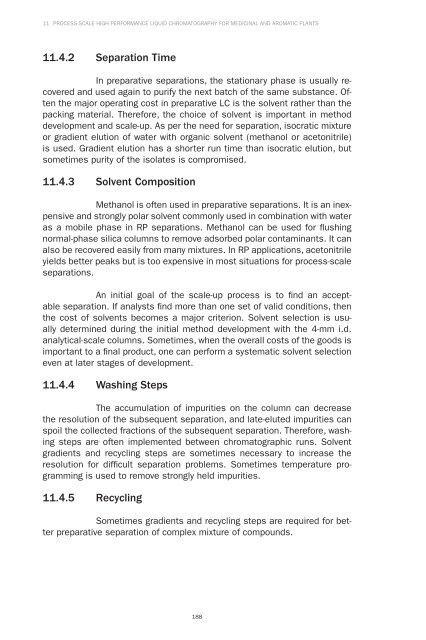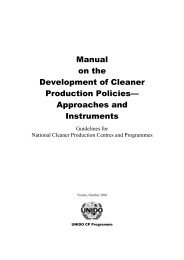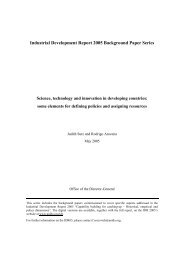Extraction Technologies For Medicinal And Aromatic Plants - Unido
Extraction Technologies For Medicinal And Aromatic Plants - Unido
Extraction Technologies For Medicinal And Aromatic Plants - Unido
You also want an ePaper? Increase the reach of your titles
YUMPU automatically turns print PDFs into web optimized ePapers that Google loves.
11 PROCESS-SCALE HIGH PERFORMANCE LIQUID CHROMATOGRAPHY FOR MEDICINAL AND AROMATIC PLANTS<br />
11.4.2 Separation Time<br />
In preparative separations, the stationary phase is usually recovered<br />
and used again to purify the next batch of the same substance. Often<br />
the major operating cost in preparative LC is the solvent rather than the<br />
packing material. Therefore, the choice of solvent is important in method<br />
development and scale-up. As per the need for separation, isocratic mixture<br />
or gradient elution of water with organic solvent (methanol or acetonitrile)<br />
is used. Gradient elution has a shorter run time than isocratic elution, but<br />
sometimes purity of the isolates is compromised.<br />
11.4.3 Solvent Composition<br />
Methanol is often used in preparative separations. It is an inexpensive<br />
and strongly polar solvent commonly used in combination with water<br />
as a mobile phase in RP separations. Methanol can be used for fl ushing<br />
normal-phase silica columns to remove adsorbed polar contaminants. It can<br />
also be recovered easily from many mixtures. In RP applications, acetonitrile<br />
yields better peaks but is too expensive in most situations for process-scale<br />
separations.<br />
An initial goal of the scale-up process is to fi nd an acceptable<br />
separation. If analysts fi nd more than one set of valid conditions, then<br />
the cost of solvents becomes a major criterion. Solvent selection is usually<br />
determined during the initial method development with the 4-mm i.d.<br />
analytical-scale columns. Sometimes, when the overall costs of the goods is<br />
important to a fi nal product, one can perform a systematic solvent selection<br />
even at later stages of development.<br />
11.4.4 Washing Steps<br />
The accumulation of impurities on the column can decrease<br />
the resolution of the subsequent separation, and late-eluted impurities can<br />
spoil the collected fractions of the subsequent separation. Therefore, washing<br />
steps are often implemented between chromatographic runs. Solvent<br />
gradients and recycling steps are sometimes necessary to increase the<br />
resolution for diffi cult separation problems. Sometimes temperature programming<br />
is used to remove strongly held impurities.<br />
11.4.5 Recycling<br />
Sometimes gradients and recycling steps are required for better<br />
preparative separation of complex mixture of compounds.<br />
188

















